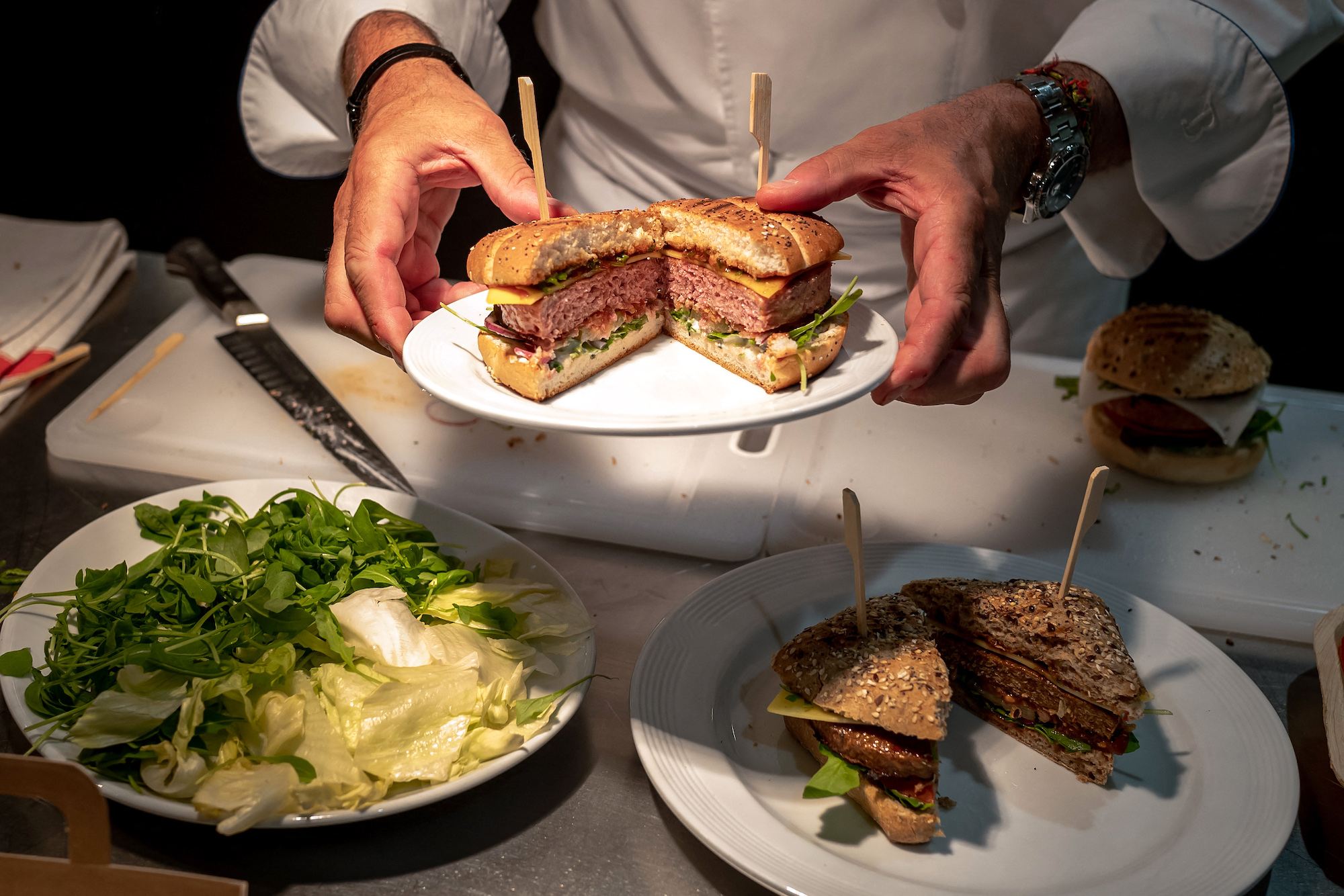By Nathalie Olof-Ors | Photos by Fabrice Coffrini/AFP
Have a beef with beef? A burgeoning veggie burger industry is using artificial intelligence to propose alternatives.
Swiss group Firmenich, one of the world’s leading flavor manufacturers, says recreating the sensation of beef relies not only on flavor, texture, and color but also on how it responds to cooking and the way it feels in the mouth.
“Finding a protein that resembles meat from a vegetable protein is highly complex,” Emmanuel Butstraen, head of Firmenich’s flavors unit, told AFP at the company’s headquarters in Satigny outside Geneva.
One of the toughest challenges is avoiding an unpleasant aftertaste. Pea proteins tend to release bitterness, which the taste buds are quick to pick up, Butstraen noted.
Vegetable proteins can give off hints of green apples or pears, an aftertaste of beans, astringency or even a feeling of dryness, said Jerome Barra, the company’s innovation director.
To mask these flavors or compensate for them with other tastes, the aromatics experts can call on a vast library of ingredients. Barra likened the computer-logged database to “a piano with 5,000 keys,” from which the flavors can be composed.
Barbecue flavor
“Artificial intelligence can generate millions of possibilities,” Barra said.
He said the algorithms can generate not only a wide range of flavor combinations but also factor in shifting consumer preferences, along with technical or regulatory constraints.
One of the toughest challenges [of finding a protein that resembles meat from a vegetable protein] is avoiding an unpleasant aftertaste. Pea proteins tend to release bitterness, which the taste buds are quick to pick up, Emmanuel Butstraen, head of Firmenich’s flavors unit, noted.
They filter down the combination of ingredients from which the experts can create flavors, he said. Only then are they road-tested in the kitchen with a chef.
The algorithms can propose multiple combinations that the human expert aromaticians might not have conceived.
AI has notably enabled Firmenich to develop an aroma that replicates the specific flavor of barbecued meat, with the algorithms helping to pin down similar flavors in the plant world.
“Plant-based food is a very important shift in consumption,” said Firmenich chief executive Gilbert Ghostine.
“I see this trend growing stronger and stronger in future,” he said, pointing to meat and dairy alternatives among the nutrition trends with the highest growth potential.
According to a study by the Credit Suisse bank, the market for meat and dairy alternatives is already worth around $14 billion globally, will reach $143 billion by 2030—and $1.4 trillion by 2050.
With the rise of flexitarian diets and concerns over meat’s carbon footprint, the market for vegetarian alternatives is booming under the influence of US startups such as Beyond Meat or Impossible Foods as well as industry giants such as Nestle or Unilever, which have jumped on the bandwagon.
Market growth

“Steaks, cutlets and other vegetable burgers are highly processed foods whose value depends on their ingredients, which vary from one product to another,” Muriel Jaquet, dietician for the Swiss Nutrition Society, told AFP.
The organization, which works with the Swiss health ministry, recommends eating one portion per day of meat, fish, eggs or alternatives such as tofu.
On vegetarian steaks, it advises consumers to check the salt, sugar, and fat content.
After rising 11.4 percent in 2019, the global growth in sales of meat alternatives slowed to 1.3 percent in 2020 but should climb again by 5.1 percent this year and 6.3 percent in 2022, according to market researchers Euromonitor International.
By comparison, meat products—more affected by the coronavirus crisis—saw only 0.3 percent growth in 2020, with a more modest recovery of 2.9 percent expected in 2021 and 4.6 percent in 2022.
© Agence France-Presse












































